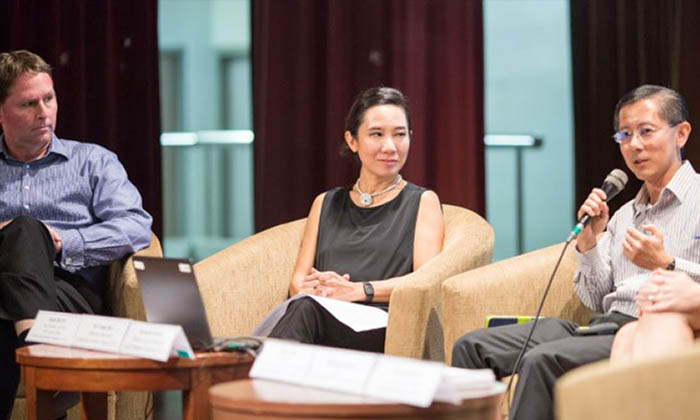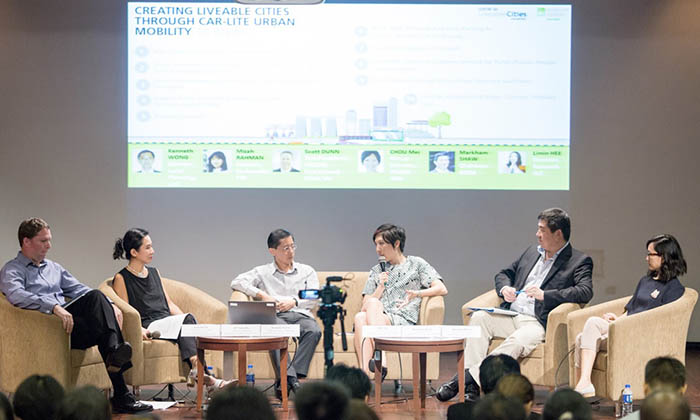Creating Liveable Cities through “Car-Lite” Urban Mobility

28 November 2016

3.00pm – 5.30pm. Registration from 2.30pm, seated by 3.00pm

MND Auditorium
Resources
Lecture Video
Synopsis
Since the early days, Singapore’s approach to urban mobility has aimed to strike a balance between the needs of the people with economic growth and a sustainable environment. Moving forward, Singapore is focusing on achieving a ‘car-lite’ future to ensure greater sustainability in urban development. Based on the new book co-published by the Centre for Liveable Cities and the Urban Land Institute, “Creating Liveable Cities through ‘Car-lite’ Urban Mobility“, the lecture will discuss current challenges in reducing car reliance, enablers such as new mobility options and the roles that public, private and people sectors can each play in shaping this future. The panel will also share personal experiences in building up advocates for a car-lite environment and the business viability of ‘car-lite’ developments.
Lecture Report

“We have seen all over the world that cities that put people before cars help to create places that are vibrant
and people-friendly, much more enjoyable for people to hang around in.
“In Singapore, faced with our land constraints and a growing population, we know it’s not possible and not
sustainable to keep building more roads for more cars. This will lead to pressure for more infrastructure like
highways and carparks that will leave less space for people to enjoy good quality public life.
“It’s important for us to look at other modes
of mobility so that we can rely less on private
cars, and continue to grow as a city while
maintaining a good quality of life.”
— Chou Mei, Group Director,
Conservation and Urban Design, Urban Redevelopment Authority
The ways in which people move around Singapore are about to undergo transformational change — this was
the consensus at CLC’s Car-Lite Urban Mobility panel on 28 November.
New directions in urban mobility, from walking, cycling and greater public transport coverage, are well in
motion. “These three initiatives — walk, cycle and ride — are our priorities and that’s very clear to us,” said
Kenneth Wong, the Land Transport Authority’s Director for Local Planning.
Noting that travel demand is forecast to increase
by 50% by 2030, Wong added: “We all know
it’s not sustainable to meet this demand via road
expansion. With demographic changes and an
elderly population, there’s an emphasis on safer
roads and safer streets. We aspire to create a
culture where everybody actively walks, cycles
and rides public transport, and creating a safe,
inclusive environment for all.”
Initiatives that have been launched include locating jobs closer to homes and infrastructure to encourage
walking and cycling, a substantial expansion of Mass Rapid Transit lines, managing vehicle growth rates and
planning for car-lite towns.
A key driver of reducing societal reliance on cars is the freeing up of valuable land for public spaces and more
engaged communities, alongside environmental and sustainability imperatives.
“Fundamentally, it’s about a better connection
with the adjacent land uses, whether they be
residential, commercial or retail...[as well as]
an urban environment conducive for people to
interact, engage and create meaning in their
communities,” said Scott Dunn, Vice President
of AECOM, an engineering and consulting
firm for infrastructure projects.
Streets that are not clogged up with cars also
benefit the private sector. Markham Shaw,
Chairman of the Orchard Road Business
Association, said: “Developing a car-lite country
and modern urban logistics...would take vehicle
pressure off the streets and give them back to the
people. A happier population means that people
will spend more money. In cities that have gone
car-lite or have car-free centres, real estate prices
in those areas have increased significantly.”
Beyond providing the necessary infrastructure for these initiatives however, the panellists agreed that a mindset
change in society and education is vital.
“It’s about understanding the transport needs
and challenges that vulnerable users of public
spaces (including children and the elderly) face,”
said Mizah Rahman, Director of Participate in
Design, a non-profit organisation focusing on
community-owned spaces and solutions. “We need
to have them in the conversation in the planning
of our public spaces.”
Through the medium of games and workshops, Participate in Design brings together children, parents and
educators to explore topics such as road safety, urban planning and reducing reliance on cars.
Social norms, including formal office attire that may discourage people from cycling to work, may evolve in the
years to come. “I’ve been thinking about the way we dress — do we need to be in long-sleeved attire all the
time?” asked the LTA’s Wong.

“As the cycling culture grows, we may be dressed in polo t-shirts or something else that
facilitates cycling. We could go for meetings and nobody’s ashamed to be in different attire.”
The panel closed with a series of quick-win solutions for car-lite urban mobility. These included education and
spreading the active mobility message among the young, the pedestrianisation of major thoroughfares such as
Orchard Road, more car-free pilots to demonstrate positive change, as well as building quickly upon successes.
This report first appeared in the
Dec 2016 Better Cities newsletter.
About the Speakers
PANELLIST
Kenneth Wong
Director, Local Planning
Land Transport Authority (LTA)
Mr Wong has more than 10 years of experience in the development of Singapore’s land transport
system as a transport planner. He was previously the Deputy Director of Policy where he contributed
towards land transport policy formulation in the 2008 Land Transport Master Plan. Mr Wong has led
many LTA planning teams in the development of Singapore’s long term and medium term transport
infrastructure plans and has conducted various feasibility studies for road and rail projects; one of
which is Singapore’s 9th expressway, the 12 km Kallang-Paya Lebar Expressway.
PANELLIST
Mizah Rahman
Director, Co-founder
Participate in Design (P!D)
Mizah is a designer and community organizer who is a strong advocate for a participatory and
community-centric approach in the design and planning of cities and neighbourhoods. Mizah’s
portfolio of participatory-based works has expanded to include neighbourhood planning,
public space design, and community art installations; working in partnership with grassroots
organisations, educational institutions, civic groups and government agencies. She is currently
an Associate Lecturer at Ngee Ann Polytechnic, School of Design and Environment.
PANELLIST
Scott Dunn
Vice President, AECOM and
Past Council Chair, Urban Land Institute Singapore (ULI)
Mr Dunn directs multidisciplinary teams on the design of mixed-use new communities and
high-density master plan developments across Asia, including customizing a sustainability
assessment framework tool for Jurong Lake District and the Marina Bay Greater Southern
Waterfront district in Singapore, as well as leading the River of Life transformation project in
Kuala Lumpur. Mr Dunn’s papers, advocating sustainable land development and high dense
urban environmental design, have been published in several local and international design
magazines and he is highly regarded as a thought leader in the planning community.
PANELLIST
Chou Mei
Group Director, Conservation and Urban Design
Urban Redevelopment Authority (URA)
Ms Chou has been with URA since 2000 and has been involved in the planning and
shaping of Singapore’s city centre. Her portfolio in recent years has included driving
and overseeing various projects in the city centre via the integration of land use, urban
design and conservation. She received her training in Architecture at the Bartlett School of
Architecture, University College London.
PANELLIST
Markham Shaw
Chairman
Orchard Road Business Association (ORBA)
Mark is the Chairman of ORBA, an organisation that seeks to enhance and improve the business
environment of Orchard Road, one of the world’s most acclaimed shopping, dining and entertainment
precincts. He is also the Executive Vice President of The Shaw Organisation Group of Companies.
With his engineering background, Mark is actively involved in the Group’s real estate development
and theatre operations.
MODERATOR
Dr Limin Hee
At CLC, Dr Hee has oversight of the Centre’s research strategies, initiatives and collaborations.
Previously, she led the Urban Studies Research and Teaching Group, and was a Principal
Investigator at the Centre for Sustainable Asian Cities at the National University of Singapore.
Dr Hee was also a co-founder of Transurban, a Research and Design group focused on EcoArchitecture and Urbanism at Harvard University Graduate School of Design. As an Architect,
Dr Hee had completed several public projects in Singapore and received several commendations
and awards for her work.